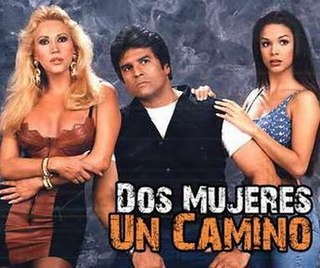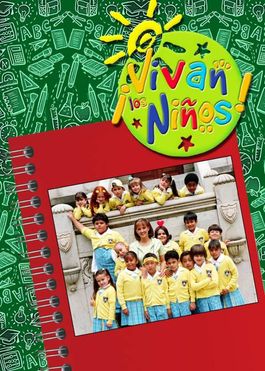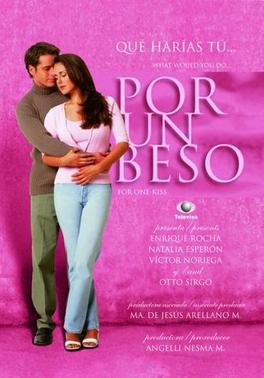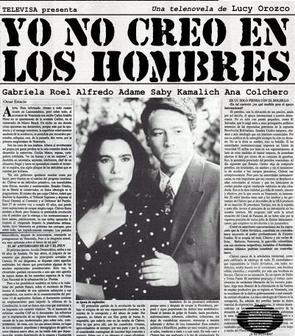Related Research Articles

Dos mujeres, un camino is a Mexican neo-noir telenovela produced by Emilio Larrosa for Televisa in 1993-1994. This production was exhibited in 47 countries, including Indonesia, had high viewer ratings, and has been described as one of Televisa's most successful telenovelas.

¡Vivan los niños! is a Mexican telenovela produced by Nicandro Díaz González for Televisa. It aired on Canal de las Estrellas from July 15, 2002, to March 17, 2003. It's an adaptation of the 1983 Argentinean telenovela Señorita maestra.

Muchacha italiana viene a casarse is a 1971 Mexican telenovela by Televisa produced by Ernesto Alonso and directed by Alfredo Saldaña, starring Angélica María and Ricardo Blume. Writing credits belong to Delia González Marquez, Fernanda Villeli (adaptation), Marissa Garrido (adaptation), Miguel Sabido (adaptation) and Carlos Lozano Dana (adaptation)

Mi Destino Eres Tú is a Mexican telenovela produced by Carla Estrada for Televisa that premiered on July 10, 2000 and ended on November 10, 2000. It is an original story by Carmen Daniels and Jorge Lozano Soriano. Lucero sang the theme song of the series, being released in the album Mi destino. It stars Lucero, Jorge Salinas, Susana Zabaleta and Jaime Camil.

Hasta que el dinero nos separe is a Mexican telenovela premiered on Canal de las Estrellas on June 29, 2009, and concluded on May 16, 2010. The series is created and produced for Televisa by Emilio Larrosa, based on the Colombian telenovela Hasta que la plata nos separe written by Fernando Gaitán. It stars Pedro Fernández and Itatí Cantoral as the titular characters.
The second annual Altazor Awards took place on March 26, 2001, at the Teatro Municipal de Santiago.
Mujer Comprada is the title of a Spanish-language telenovela produced by the Mexican television network TV Azteca.
La antorcha encendida is a Mexican telenovela produced by Ernesto Alonso and Carlos Sotomayor for Televisa in 1996. It was the last historical telenovela produced by Televisa. The plot tells the Independence of Mexico, with an emphasis on historical accuracy. It was written by Fausto Zeron Medina in collaboration with Liliana Abud. It premiered on Canal de las Estrellas on May 6, 1996, and ended on November 15, 1996.

Por un beso is a Mexican telenovela produced by Angelli Nesma Medina for Televisa in 2000. Based on La gata by Inés Rodena. It premiered on November 13, 2000 and ended on March 30, 2001.

La esposa virgen is a Mexican telenovela produced by Salvador Mejía Alejandre for Televisa in 2005. The story is a remake of 1985 Mexican telenovela Los años pasan.
Separados is a Chilean telenovela originally aired on TVN.

Yo no creo en los hombres is a Mexican telenovela produced by Lucy Orozco in association with Isabelle Tardán for Televisa in 1991. This is based on the radionovela Yo no creo en los hombres written by Caridad Bravo Adams.
Barata de primavera is a Mexican telenovela produced by Valentín Pimstein for Televisa in 1975.
Mi hermana la nena is a Mexican telenovela produced by Valentín Pimstein for Televisa in 1976.
Carrusel de las Américas is a Mexican Children's telenovela produced by Valentín Pimstein for Televisa in 1992. It is both a sequel and remake of 1989 telenovela Carrusel. Chain member of the memorial project Americas 500 years since the discovery of America. It was shown via satellite to Latin America as part of that program block.

Bajo un mismo rostro is a Mexican telenovela produced by Christian Bach and Humberto Zurita for Televisa in 1995.
Retrato de familia is a Mexican telenovela produced by Lucy Orozco for Televisa in 1995.
María José is a Mexican telenovela produced by Juan Osorio for Televisa in 1995.
References
- ↑ "Cuando los hijos se van" (in Spanish). novelasyseries.univision.com. Retrieved August 11, 2014.